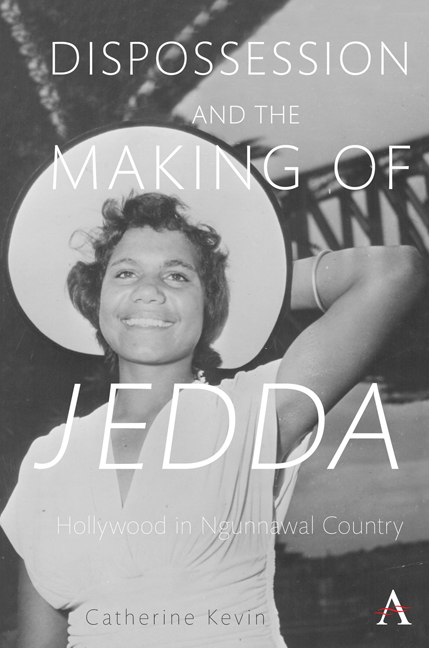Book contents
- Frontmatter
- Dedication
- Contents
- List of Figures
- Acknowledgements
- Introduction: Jedda (1955): Cultural Icon and Shared Artefact of Mid-Twentieth-Century Colonialism
- 1 Financing Jedda
- 2 Hollywood in the ‘Fine Wool Hub’
- 3 Making Jedda
- 4 Viewing Jedda
- Epilogue: Bogolong Memories and the Conceit of Family History
- Index
1 - Financing Jedda
Published online by Cambridge University Press: 23 February 2022
- Frontmatter
- Dedication
- Contents
- List of Figures
- Acknowledgements
- Introduction: Jedda (1955): Cultural Icon and Shared Artefact of Mid-Twentieth-Century Colonialism
- 1 Financing Jedda
- 2 Hollywood in the ‘Fine Wool Hub’
- 3 Making Jedda
- 4 Viewing Jedda
- Epilogue: Bogolong Memories and the Conceit of Family History
- Index
Summary
Charles Chauvel was once described by a Hollywood executive as ‘savagely Australian’, but by the early 1950s he had become an internationally successful director, courted by Hollywood and London. His seventh film, Sons of Matthew (1949), a homage to the Australian pioneer legend, was backed by Universal Studios and Greater Union. After its successful release in Australia and overseas, Chauvel returned to Hollywood for the fourth time. He was based at Universal Studios, where he considered the offer of a directorial contract with the studio. Around the same time, an Ealing Studios representative from Britain also sought to bring him on board. Yet despite the tantalizing promise of expanding his presence in the international film industry, for his new project, Jedda, he could not gain the financial assurances from the United States that he had become accustomed to, or that he might have had, had he chosen a different, less ambitious and less Australian project. Universal, the source of the Chauvels’ most consistent financial support since the early 1930s, was not prepared to consider Jedda. His commitment to a particular version of Australian authenticity inspired an unacceptable level of uncertainty. The Chauvels’ own production company, Expeditionary Films, responsible for Heritage (1935) and Uncivilised (1936), had folded in the late 1930s. A new source of funding had to be found.
In Charles Chauvel's vision, Jedda was to be a home-grown picture for a global market that would revolutionize both the aesthetics and the economics of the Australian film industry. Speaking to a journalist in 1955, Chauvel explained that he intended to ‘break the ice’ of the European market with Jedda in an effort to grow the industry through export so that Australia might not continue to be outranked by India and Japan among the world's film-producing countries. To do so, finances had to be sought from somewhere, at least enough to secure production in the hope that strong distribution support would follow. (It eventually did, when Columbia Pictures came on board much later to cover post-production costs.5). This was an expensive project; ultimately the film would cost close to £100,000.
- Type
- Chapter
- Information
- Dispossession and the Making of JeddaHollywood in Ngunnawal Country, pp. 15 - 30Publisher: Anthem PressPrint publication year: 2020



